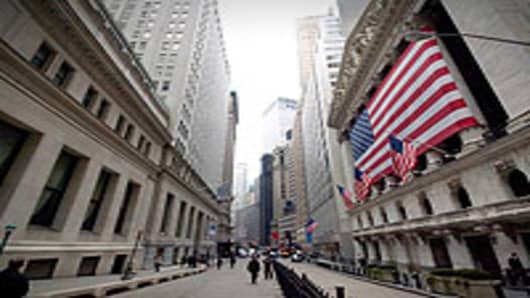A week packed with economic data, retail earnings and plenty of Fedspeak could finally give the stock market something it desperately needs: Stability.
Market pros believe that as long as the barrage of news doesn't feature any unexpected bombs, Wall Street could use this week as the fuel it needs to move forward with conviction.
A rally in the second quarter that has brought major indexes back to pre-slump levels has been on low volume, indicating that while there's belief the market is undervalued, that conviction is not widespread.
"We haven't really been rallying on good news as much as we've been rallying on the absence of bad news," says Richard Sparks, from Schaeffer's Investment Research. "We're rallying very cautiously and it's based mainly on there not having been any more earth-shaking news after Bear Stearns in mid-March...What we might need to get it going is just time."
Like many analysts, though, Sparks sees plenty of positive signs in the market, and he believes that if the Standard & Poor's 500 can rally past 1,400, where it's been in recent days, and hold that position, it can move significantly higher.
What he and others are looking for is stability--in oil prices, the dollar, housing and in corporate earnings, particularly on the financial side, that at least come close to meeting expectations.
Others are looking to Federal Reserve Chairman Ben Bernanke and a slew of other central bank officials speaking this week to provide clues as to the forecast for the economy. If all those things pass this week without any major jolts to the system, the market will be poised to kick higher in the third and fourth quarters, though few expect a major change overnight.
"There are so many moving parts here, but overall I think ultimately it's going to be whether or not market participants believe that the credit markets are opening, if they believe we're getting more normal," says Quincy Krosby, chief investment strategist at The Hartford.
"The days that the market has gone up have been on anemic volume," she adds. "Even the breadth of the market has been narrow. You need to see that conviction escalate. When that happens it will bring in more buyers. Money tends to follow the path of least resistance."
Even though the market has been unable to sustain volume, it has escaped the volatility that plagued trading during the fourth quarter of 2007 and the first quarter of 2008. The Chicago Board Options Exchange's Volatility Index has dropped to its lowest level since Oct. 12.
A few more positive signs from the housing market and a loosening in credit would set the market on an even steadier keel.
"There haven't been the kind of surprises that would make the market really nervous," Krosby says of the VIX's drop. "You are seeing more positive signs for the market. The best positive sign for the market, though, would be a floor on housing prices and a pickup in demand in housing. That would probably be the most positive sign for both the real economy and the credit situation."
Lower oil price is also a recurring theme from those looking for incentives to bring money off the sidelines. Oil once again broke through barriers Tuesday and zoomed above $126 a barrel. The dollar, meanwhile, posted gains, again confounding the theory that a stronger dollar hurts commodities.
But broader market momentum is seen as a power that could overcome the weight of oil.
"I'm very positive about what the summer and the last two quarters are going to bring to the market. If we get a little more positive momentum, the momentum on the upside is going to be pretty strong," says Charles Massimo, of CJM Fiscal Management, who is looking for the Dow to break through 13,000 and take off from there. "I'm a big believer in momentum and psychology. Once you turn that around, regardless of what happens with oil the markets will go to a higher level."
Earlier Tuesday, Wall Street largely took in stride news that retail sales were slowingand a warning from Bernanke that the problems in the credit marketshad only been eased and not eradicated. Meanwhile, a weak earnings outlookfrom Wal-Mart contributed to a bit of a sour mood in trading.
Yet stocks slipped only marginally, giving credence to the thought that only unexpected, drastically bad news will cause major sell-offs.
"The people who should be out there buying, perhaps the smaller folks who should be starting to feel a little more comfortable, have not gotten past the deer-in-the-headlights look. If there was an ability to make gas prices drop I think you'd see a totally different change in the market," says Diane de Vries Ashley, managing partner at Zenith Capital Partners. "I'm hopeful the time of the knee-jerk reaction has passed."


